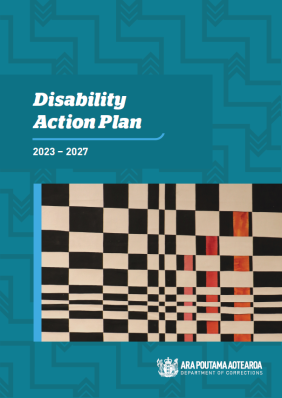In this section
Disability Action Plan 2023 – 2027
One of the New Zealand government’s main priorities is to improve the wellbeing of New Zealanders and their whānau. This is inclusive of the approximately one in four (24%) of New Zealand’s population who identify as disabled. Māori are disproportionately represented in this group compared to the general population. Tāngata whaikaha Māori/disabled people have reported experiencing discrimination and barriers that have impacted their lives, including difficulty accessing a range of health, disability, and social services. In an Ara Poutama Aotearoa context, people generally come into prison, bearing pre-existing disabilities, but some people may also develop a disability while in prison. In prison high-quality health and disability support services are critical in addressing inequitable health and wellbeing outcomes and in ensuring continuity of care when reintegrating back into the community.
While both Māori and non-Māori are impacted by disability, there are wide disparities between their experiences of disability. Māori are also disproportionately represented in the Corrections system and addressing the over-representation of Māori is a key part of our organisational strategy Hōkai Rangi: Ara Poutama Aotearoa Strategy 2019-2024.
The Ara Poutama Aotearoa Disability Action Plan acknowledges the need to ensure that tāngata whaikaha Māori/disabled people managed by Ara Poutama Aotearoa have a culturally safe environment. It establishes priority areas of action for achieving aspirations and reducing barriers that may impede tāngata whaikaha Māori/disabled people and their whānau, from achieving better outcomes.
The Plan has been developed with reference to the Waitangi Tribunal in the Hauora Inquiry, which identified the need to enable and support self-determination and mana motuhake in the design, delivery, and monitoring of health and disability services. We have also used the social model of disability, which emphasises independence and operates from a strength-based approach to support the plan’s development. This plan also reflects our responsibility and commitment to supporting the relationship between Māori and the Crown, Te Tiriti o Waitangi / the Treaty of Waitangi, the aspirations of Hōkai Rangi, and the voices of the disability sector and tāngata whaikaha Māori/disabled people. It emphasises independence and operates from a strength-based approach. It is the start of our response to address the inequities experienced by tāngata whaikaha Māori/disabled people.
Download the Disability Action Plan PDF, 1.1 MB or read it online, in te reo Māori PDF, 826.1 KB, or choose an alternative accessible format.
Accessible formats
Easy read (word doc) DOCX, 13.4 MB
Large print (word doc) DOCX, 85.9 KB
Braille BRF, 19.8 KB (.brf format)
New Zealand Sign Language (see video below)
Content


